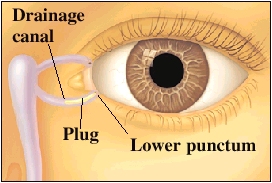Treating Dry Eyes
Treating Dry Eyes
Artificial tears are the most common treatment for dry eyes. If they don’t relieve your symptoms, your eye healthcare provider may put in plugs. Or you may have surgery to stop the draining and increase the tear film.
Artificial tears
Artificial tears, or lubricating eye drops, replace your natural lubricating tears. You can buy most lubricating eye drops without a prescription. And you can use them as often as needed. Lubricating eye drops are not the same as eye drops used to relieve redness or itching. Check with your eye healthcare provider or pharmacist to be sure you buy the right drops.
Some lubricating eye drops have chemicals called preservatives. This makes them last longer. Your eyes may be sensitive to these drops. Or you may need to use them often. If so, you may want to buy lubricating eye drops made without preservatives. Your eye healthcare provider may also suggest using a lubricating eye ointment at night.
Medicine
Your eye healthcare provider may prescribe medicine such as cyclosporine to treat your eye condition. It can help increase your eyes' ability to make tears.
Plugs
Closing the puncta with plugs can help keep the tear film on your eye. The plug acts like a stopper in a sink. It allows only a small amount of tears to drain out of your eye. Your eye healthcare provider may first try short-term (temporary) plugs that dissolve in a few days. If these help, he or she may then put in long-term plugs. Your eyes will be numbed with drops when the plugs are inserted. You shouldn’t feel any pain. And you shouldn’t feel the plugs once they’re in.
Surgery
If artificial tears or plugs don’t relieve your dry eyes, surgery may be an option. Your eye healthcare provider may do minor outpatient surgery to narrow or block the openings to the drainage canals. If your dry eyes are caused by eyelid problems, your eye healthcare provider may recommend other kinds of surgery.
Updated:
November 09, 2017
Reviewed By:
Bogus, William J., OD, FAAO,Haupert, Christopher L., MD
